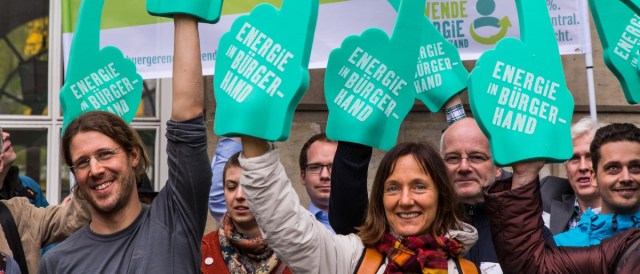This week, the European Commission will respond to Europe’s first citizens’ initiative, this time for the “right to water.” Craig Morris wonders whether making your energy is not also a right.

Protest for energy democracy and a bottom-up Energiewende in 2013. (Photo by Jörg Farys, CC BY NC ND)
In its drive to privatize former state-run sectors, the European Union has pushed to have water supply sold off to private firms. The history is a bit longer, however; the City of Paris privatized its water supply in 1985 under a conservative government. Not everyone was happy with the change, though; some citizens felt that the new focus was on rent-seeking, not high-quality services.
In the wake of the fall of communism, privatization became common. So apparently did public dissatisfaction, leading to Europe’s first campaign against the European Commission: the Right2Water. The initiative argues that “water is a public good, not a commodity” – a contentious standpoint. While bodies of water are part of the commons, tap water is as much an industrial product as it is a natural, shared resource.
Still, an argument can be made that a focus on high returns for investors (many of whom are driven by short-term profits) too easily conflicts with the goal most citizens would want water providers to have: affordable, high-quality water supply. Markets address the desires of customers with money, not the needs of citizens regardless of spending power. Competition on the market for computer tablets might benefit consumers, but not all citizens are consumers of such devices. But we all need water.
In both the energy and water sectors, there is the question of natural monopolies; from power grids to water pipes, we are talking about an infrastructure that we do not wish to duplicate simply in order to have competition. In both the water and energy sectors, governments have sanctioned private monopolies of services previously provided by state-run entities in the hopes of lowering costs. Around 1990, the belief was that the private sector was more efficient than governments. 25 years later, we no longer need to base the discussion on belief systems; we have hard data.
The EU wishes to have a set-aside for “small” community projects. Maybe we should do away with size restrictions and say that communities and energy cooperatives should be allowed to build what they want? If a need for further energy supply remains, private firms can compete with each other for that business. At present, the European Union is proposing to focus on low cost, with the foreseeable outcome being that private firms will be able to build large projects, while communities are told their ideas would be too expensive.
The switch from state-run water services to the private sector made the public aware of the difference between the two options, but the possibility of energy democracy is poorly understood outside Germany even among proponents of renewables. Do citizens have the right to make their own energy? Should such a right be made law explicitly?
Craig Morris (@PPchef) is the lead author of German Energy Transition. He directs Petite Planète and writes every workday for Renewables International.
I’m a bit surprised by this article. The control the big water giants have on water networks can directly be compared to how RWE or E.On control the grid, and rent-seeking behavior has been confirmed in many cases.
In 2010, the town of Paris decided to take back direct control of it’s water, then was able to increase investments and lower prices a bit. It’s now cheaper than everywhere else around Paris where the water network operator is private.
JMdesp, so what surprises you? Are you not aware of the citizen grid takeover movement in Germany? You seem to be agreeing with me.